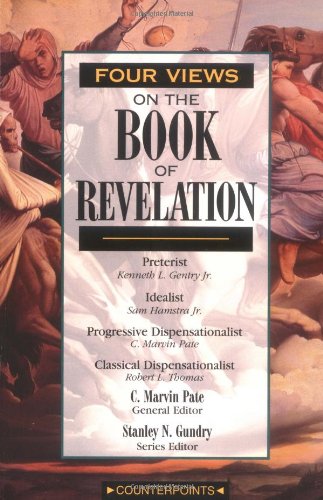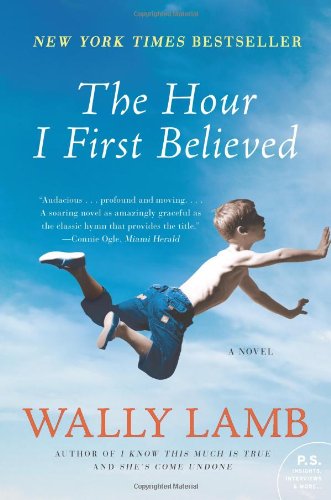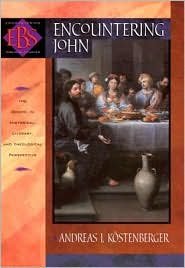2 Samuel 24:1, David numbers the army
Again the anger of the LORD burned against Israel, and he incited David against them, saying, “Go and take a census of Israel and Judah.”
//So, David did as God asked. He sent his army commanders through the twelve tribes of Israel to enroll and number all the fighting men. They counted eight hundred thousand fighting men in Israel, five hundred thousand in Judah.
David, however, becomes “conscious-stricken.” Inexplicably, David realizes he has sinned. God is angry, and kills seventy thousand men with a plague because of David’s mistake. But didn’t David do exactly what God asked?
This whole confusing episode is straightened out when the story is rewritten hundreds of years later in the book of Chronicles. There, in 1 Chronicles 21:1, we learn God never told David to number the people. Satan did.
And Satan stood up against Israel, and provoked David to number Israel.
Got an opinion? 0 commentsBook review: Four Views on the Book of Revelation
]by Stanley N. Gundry and C. Marvin Pate
★★★★
This book presents the book of Revelation from four different perspectives. After about a 30-page overview, four different authors present their insights.
Kenneth L. Gentry, Jr. covers the Preterist view. There are variations of Preterism, but the general idea is that the Bible’s eschatological promises have been fulfilled. Revelation’s bloody war scenes occurred in the first century. Gentry is an established Revelation scholar who writes clearly, but this is not his most lucid writing.
Sam Hamstra Jr. writes about an Idealist view. I would call it a “spiritual” view. Such interpreters find Revelation to be a message of “assurance, hope and victory” in its relevance to today’s struggles.
C. Marvin Pate, who serves also as the book’s general editor, discusses a “progressive dispensationalist” view. The arrival of Jesus 2,000 years ago is the dawning of a the “age to come,” but it is not yet complete; it awaits the Parousia for its consummation.
Finally, Robert L. Thomas lays out the classical Dispensationalist view, the common futuristic interpretation. While there are still many divisions in this category, Thomas strives to present a “typical” belief.
In my opinion, Steve Gregg’s book Revelation, Four Views–A Parallel Commentary on the same topic is more comprehensive and objective, and also more readable. But it’s also much longer; today’s book should be considered a compact, argumentative introduction by comparison.

Song of Solomon 6:8-9, The One and Only
Even among sixty queens and eighty concubines and countless young women, I would still choose my dove, my perfect one.
//Five chapters of sappy love language we’ve endured before we get to this verse in chapter six of the Song of Solomon. Is this really Solomon speaking? Somebody has definitely caught his eye:
Your eyes are like doves behind your veil. Your hair falls in waves, like a flock of goats winding down the slopes of Gilead. Your teeth are as white as sheep, recently shorn and freshly washed. Your smile is flawless, each tooth matched with its twin. Your lips are like scarlet ribbon; your mouth is inviting. Your cheeks are like rosy pomegranates behind your veil. Your neck is as beautiful as the tower of David, jeweled with the shields of a thousand heroes. Your breasts are like two fawns, twin fawns of a gazelle grazing among the lilies …
… and then a bit later, today’s verse about all his other queens and concubines, which yanks us from our reverie with a cold, hard fact. This “perfect one” is one of a long string. Solomon has already run through 140 women, and he’s got another 859 to go after her. With lines like these, we shouldn’t be surprised.
Got an opinion? 0 commentsBook review: Points of Apostasy: Conservatives vs. The Bible
by Richard Musick
Today’s book forms a compromise for me. I am not political, and I want nothing to do with politics on my blog, yet curiosity about a book led me to agree to do a review. I said I’d introduce the book and its content without a rating, fearing any rating might be misconstrued as approval or disapproval of the book’s political stance. So, here goes.
“If a belief, principle, or action is in accordance with the Bible, it is right. If it is not in accordance with, or is contrary to, the Bible, it is wrong.” Do you agree?
“When I decide what position I wish to take on an issue, I decide based upon Biblical guidance. That is also how I decide how to vote on any given issue.” Do you approve?
Musick highlights the George W. Bush administration to drive home his points. He delves into Bush’s record and accomplishments, concluding that while Bush promoted himself as a Christian leader, he acquiesced to non-Christian values. Musick sites example after example, and calls Bush’s form of Christianity “apostasy.” Question: Is the Bible a clear, straight, and consistent plumb line by which to measure leaders and the appropriateness of their decisions? Are religious labels, whether used in condemnation or approval, appropriate terms for political judgment?
Now, after you’ve had a moment to form an opinion about the above questions, you might be surprised at the Christian values Musick wishes our government would uphold (taken from the chapter headings):

Ezekiel 4:9, Ezekiel’s bread
Take wheat and barley, beans and lentils, millet and spelt; put them in a storage jar and use them to make bread for yourself. You are to eat it during the 390 days you lie on your side.
//Here’s a healthy treat that you can enjoy even if bed-ridden. In one of Ezekiel’s more questionable stunts, he lay on his left side, bound with ropes, for 390 days, bearing the sin of Israel. One day for each year of their sin. During all these days, he ate only this bread, so it must be nourishing.
You can try this bread yourself, if you wish. Food for Life sells “Ezekiel 4:9″ bread in yuppie markets everywhere.
Do, however, be very careful about which bread you order. You don’t want to accidentally get the “Ezekiel 4:13″ recipe. After 390 days, Ezekiel was instructed to roll over on his right side, and there eat bread for 40 days, representing the 40 years that Judah sinned. This bread was baked with human excrement. Ezekiel protested, and was granted to right to cook with cow manure instead, but I still think the first recipe is preferable.
Book review: The Hour I First Believed
by Wally Lamb
★★★
Spoiler alert…
If there’s one word to describe this book, it’s “joyless.” After seven hundred pages of painful reminiscing about tragic deaths, troubled teens, Columbine, and depression, the main character reaches a solemn conclusion about life and it’s one hope. Life’s redeeming quality is an enduring hope for a better future.
Caelum, Wally’s first-person character, struggles to understand. “God: big G, little g? Buddha? Allah? The Holy Trinity? Is god the DNA we bring forth? The genes that mutate on the cliff’s edge of chaos? Beats me.” Caelum slides not-so-gently into old age by book’s end, nearly everything taken from him, and finally reaches acceptance.
Leave this book to the psychologists; it’s a downer. I wouldn’t review it except that it did resonate with me in one way. For some, the only imaginable “better future” is heaven. Some say that my brand of Christianity and its focus on our earthly life serves only to rob others of faith. Heaven is a dream held out to all who find themselves buried under life’s hopelessness. Do we truly need our dreams of heaven, and if so, am I performing a disservice by promoting the humanitarian side of Christianity over the supernatural? Am I stealing the joy of the next life from believers in the same way Wally steals our joy in this life?
I confess, it sometimes troubles me.

Genesis 5:27, How did Methuselah die?
Altogether, Methuselah lived 969 years, and then he died.
//Methuselah’s claim to fame is that he lived longer than anybody else in the history of the world. But how did he die? The Bible doesn’t say for sure. Let’s trace his life, and see if we can figure the mystery out.
When Methuselah is 187, he has a son named Lamech. (Genesis 5:25)
When Lamech is 182, he has a son named Noah. (Genesis 5:28) Methuselah is now 369.
Noah’s the guy who built the ark. When Noah was 600, the flood waters began. (Genesis 7:6) Methuselah is now 969, the age of his death.
Genesis 7:7, And Noah and his sons and his wife and his sons’ wives entered the ark to escape the waters of the flood. Poor Methuselah. He wasn’t on the ark. I bet he could have made it to age 1,000.
(Tradition holds, by the way, that Methuselah died seven days before the flood, and that God delayed the flood for seven days of mourning in his honor.)
Book review: Encountering John
by Andreas J. Kostenberger
★★★★★
The Gospel in Historical, Literary, and Theological Perspective. That’s the subtitle, that’s what attracted me to the book, and that’s why it gets a five-star review. Because it delivers exactly what it promises, without turning into monstrous tome.
This is a classroom text, complete with tables, charts, pictures, study words, fascinating sidebars, keywords, and some very helpful appendix topics. I’m thinking that perhaps the best way to convey the flavor of this book is to list some of the sidebar headings:
The So-called Johannine Pentecost
The writing is interesting and inspiring, and the topic of John’s Gospel is well covered from several angles. I have a couple shelves of books about Johannine writings, and if I were to pick one as a stand-alone introduction, this would be it. The most highly recommended overall learning tool about John’s Gospel in my library.

Revelation 6:7-8, The Four Horsemen of the Apocalypse, Part V of V
When the Lamb opened the fourth seal, I heard the voice of the fourth living creature say, “Come!” I looked, and there before me was a pale horse! Its rider was named Death, and Hades was following close behind him. They were given power over a fourth of the earth to kill by sword, famine and plague, and by the wild beasts of the earth.
//This is the concluding post for our discussion of the four horsemen, and how they relate to the time of John of Patmos. If this historical-critical treatment of Revelation intrigues you, be sure to pick up my book at http://www.thewayithappened.com
The fourth rider brings the expected climax after the famine and bloodshed of prior horsemen: Death. The color of this horse, rendered “pale” in the New International Version, actually denotes a pallid yellowish-green, the color of putrifaction. Again I’ll quote first-century historian Josephus about the Jerusalem war of 70 A.D.: “So all hope of escaping was now cut off from the Jews, together with their liberty of going out of the city. Then did the famine widen its progress, and devoured the people by whole houses and families; the upper rooms were full of women and children that were dying by famine; and the lanes of the city were full of the dead bodies of the aged.” He goes on to describe the stench of the dead bodies and the thick putrefaction occurring around them. Josephus’ estimate of the number of Jews dying from this war is 1.2 million.
Only by grasping the utter horror of the time can we appreciate the context of Revelation. Written in a period before the tension escalated between Jews and Christians, Revelation is a poem of hope offered to the survivors of Judea, encouraging them to remain true to God and promising better times ahead.
Book review: Other Prayers of Jesus
by John Henson
★★★★
John Henson has a way of writing that makes you want to meet him. He’s opinionated but not overbearing. Humble yet interesting. I think it’s just the way John is, amusing and serious at the same time. Either that, or he has a great editor.
In twelve chapters, Other Prayers of Jesus rolls conversationally through the settings and words of Jesus as he “talks to God.” Do not imagine that this book will give you instructions for how to pray, like a checkbox you can work your way through to get God’s attention. John is not much for long prayers, certainly not long public prayers. He just describes what Jesus felt and said—sometimes aloud, sometimes in quiet contemplation—in the presence of his daddy.
The insinuation, of course, is that we would do well to live in the presence of God as casually as Jesus. There are a number of interesting anecdotes and thoughtful opinions sprinkled throughout, but I’d say the flavor of the book is really more inspirational than exegetical or instructional. Part of the charm is the Bible translation. Henson quotes scripture using his own favored “Good as New” translation, which is very down-to-earth, if a bit assuming. (See Good as New: A Radical Retelling of the Scriptures by Henson.) Personally, I like it! You’ll pick up on its idiosyncrasies as you go. Rocky: Peter. Bart: Bartholomew. John the Dipper: you can guess that one.
A good book for moderates, both conservative and liberal.

















 354 Circles
354 Circles
 603 Goodreads Friends & Fans
603 Goodreads Friends & Fans

 Hello! I'm an author, historical Jesus scholar, book reviewer, and liberal Christian, which means I appreciate and attempt to exercise the humanitarian teachings of Jesus without getting hung up on any particular supernatural or religious beliefs.
The Bible is a magnificent book that has inspired and spiritually fed generations for thousands of years, and each new century seems to bring a deeper understanding of life’s purpose. This is true of not only Christianity; through the years, our age-old religions are slowly transforming from superstitious rituals into humanitarian philosophies. In short, we are growing up, and I am thrilled to be riding the wave.
I avidly read all thought-provoking religion titles. New authors: I'd love to read and review your book!
Hello! I'm an author, historical Jesus scholar, book reviewer, and liberal Christian, which means I appreciate and attempt to exercise the humanitarian teachings of Jesus without getting hung up on any particular supernatural or religious beliefs.
The Bible is a magnificent book that has inspired and spiritually fed generations for thousands of years, and each new century seems to bring a deeper understanding of life’s purpose. This is true of not only Christianity; through the years, our age-old religions are slowly transforming from superstitious rituals into humanitarian philosophies. In short, we are growing up, and I am thrilled to be riding the wave.
I avidly read all thought-provoking religion titles. New authors: I'd love to read and review your book!
 Hi! While Lee writes the articles and reviews the books, I edit, organize, and maintain the blog. The views expressed here are Lee's but I'm his biggest supporter! :-)
Hi! While Lee writes the articles and reviews the books, I edit, organize, and maintain the blog. The views expressed here are Lee's but I'm his biggest supporter! :-)
Connect With Me!